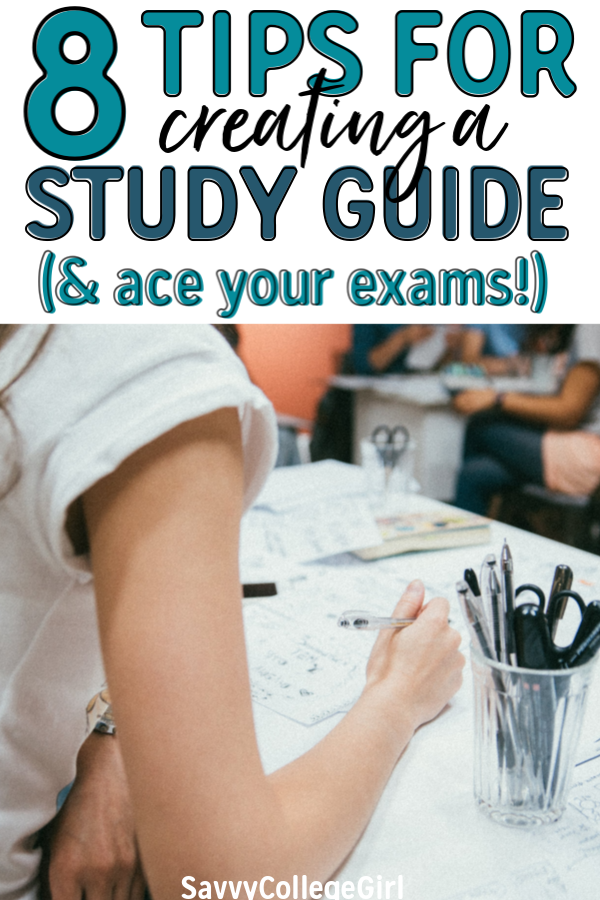
This post is all about how to make a study guide to ace your college exams.
Knowing how to create an effective study guide is a great tool to have, and will have a massive impact on how you learn and retain information.
Studying and learning new information can be stressful, and many just put it off till the last minute, with textbooks, lecture notes and work staring you down.
Having the skill to make your own study guide will encourage you to get started as soon as possible, and will help you make the most of your study time.
Here are some tips and suggestions on how to make a successful study guide, lessening your stress and increasing your effectiveness.
How To Make A Study Guide
1. Start From The Beginning
In order to make the most of your time studying, you need to get stuck into your work from the start.
There is no point in creating a study guide if you have done none of the work leading up to the exam.
From day one, you need to put in the work, attend your classes, do the readings and all prescribed homework.
By being consistent in your learning from the start, creating a study guide will be made much easier.
2. Always Take Notes
Whether you are in a lecture or reading at home on your own, make a point to take notes when possible.
Whether it be in the form of highlighting sections, scribbling on post-its or keeping a notepad of additional notes, writing something down helps you to internalize the information easily, and you will remember it much better this way.
Listening is easy, but consistently taking notes will be beneficial for you in the long run.
Classes, homework, and exams all work by repeating the same information in different ways, so taking notes is just another step to helping you retain information easier.
You will also have quick study notes to refer back to when it is time to create a study guide.
3. Blend Your Notes And Lectures
It will be a waste of time taking notes if you don’t do them properly. It will take some time and practice to know the best way to make notes, but you need to find the right way to balance lectures and notes from your textbooks.
If an idea or topics appear more than once between lecture notes and your textbooks, make a point of highlighting these, as they are more than likely important. Combine your lecture notes and textbook information to form a complete study guide.
4. Seek Guidance
Professors and lecturers are there to help, and you should utilize all the information and help they could offer.
Before creating your study guide, approach your professor and ask if they are going to be releasing a list of terms, ideas and possible topics that might come up in the exam.
If you take the initiative, you might be surprised at the information professors would be willing to divulge to an attentive student.
5.The Three-Step Trick
Repetition is one of the best ways to retain information, and you can incorporate this into creating your study guide, helping you remember the information better.
The first step to do is to write a lengthy outline of your course work that includes a good amount of information on each major topic. Rewrite your class notes in an organized fashion, and include extra notes from notebooks and lectures.
Once you have done this, you can move on to the second step. This time, you will cut the notes down by half, writing down the major headlines and including between 5 to 10 of the most important notes and details under each headline.
A couple of days before the exam, you should then practice the third step. Here, you must cut the notes down by half again, rewriting only the most important bullet points.
Once you have finished writing these downs, repeat them out loud along with any other details that you remember.
This type of guide forces you to rewrite the information into your own words multiple times to learn the information more thoroughly, and by the third round, you will know the information well.
6. Imagine Essay Questions
College comes with a lot of essay writing, and you can expect to encounter quite a few during your exams.
Once you have summarized your notes, look for main topics and try to come up with essay questions that may be presented in the exam. You can then practice these.
To save time, you don’t have to write out full essays, but instead, summarize the most important notes under each.
This will help you apply your knowledge to actual questions that may be asked, and allow you to be more familiar with the information you are trying to retain as well.
7. Have a Vocabulary Section
Some courses have a very specific vocabulary, and you will need to spend some extra time learning these.
Have a separate section for vocabulary, whether it is something that will come out in your exam, or if it is just to get more comfortable using major terms and understanding questions, showing the examiner that you have a good grasp on the course material.
8. Tailor It To Your Learning Style
Everyone has a different learning style, and knowing how to use yours to your advantage will make studying that much easier.
Whether you are better with visual, auditory, reading, writing or kinesthetic, use whatever you are more comfortable with, and whatever works best for you, to create your study guide.
Use diagrams, rewrite information or read it aloud to yourself over again to retain the information.
Creating A Study Guide
When creating a study guide, you need to figure out the most effective way of remembering information for yourself. Take as many notes as possible, attend your lectures, and follow the above steps on how to create a comprehensive study guide for yourself.
Getting into the above habits will help you throughout college, and soon creating a study guide will be second nature!
Don’t forget to pin, like, and share me!

